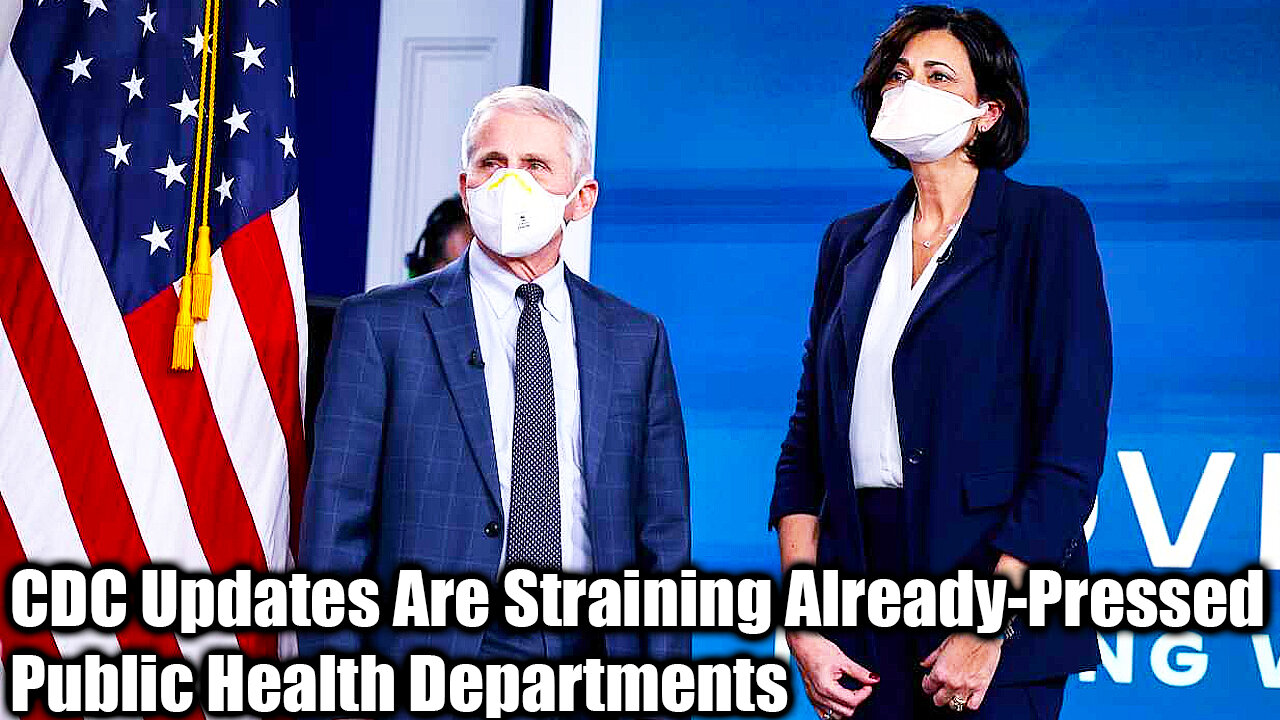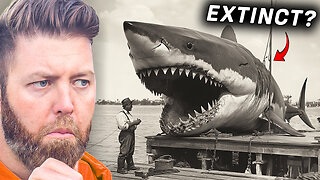Premium Only Content

CDC Updates Are Straining Already-Pressed Public Health Departments - Nexa News
CDC Updates Are Straining Already-Pressed Public Health Departments
Dr. Michael Kilkenny Did Not Expect The Centers For Disease Control And Prevention News Release He Received On Dec. 27.
Four Days Earlier, The CDC Had Cut The Isolation Time For Health Care Workers With Covid To Seven Days, If They Were Asymptomatic And Had A Negative Test.
The New Announcement Said That People With Covid Could Isolate For Just Five Days After Symptoms Developed, Instead Of 10.
“When We Got A Press Release On The 27th That Seemed To Contradict Guidance We Got On The 23rd — That Was Quite A Bombshell For Us,” Said Kilkenny, Chief Executive Officer And Health Officer Of The Cabell-Huntington Health Department, Which Serves Huntington, West Virginia, And The Surrounding County.
Around The Country, Schools And Health Organizations Scrambled To Interpret The News Release And Adjust Their Policies — Only To Change Course Again When The CDC Filled Out Details And Its Rationale In Full Guidance Published About A Week Later.
“That Gap Left Us Guessing What We Should Actually Do,” Kilkenny Said.
“That’s Not Good Management And Good Communication.
It Leads To Misunderstanding.
It Leads To Distrust.”
The CDC Decision To Cut Isolation Times In Half For Many People Who Have Caught Covid-19 Took Local Public Health Agencies By Surprise And Left Some Struggling To Explain To Their Communities Exactly What The Changes Meant And Why Federal Officials Had Made Them.
Gaps In Communication Between Federal, State And Local Officials Have Left Some Public Health Leaders Fearing That They’ve Lost Trust With Those They Serve Amid Public Confusion.
In Interviews, Three Local Public Health Leaders, One State Leader And Two Leaders Of Medical Associations Offered A Mixture Of Reactions To The CDC’s Recent Shifts: Frustration Over Lack Of Communication But Also Understanding That Every Public Health Officer Faces Challenges In Making Timely Changes And Offering Clear Guidance.
None Took Issue With The Guidance Itself.
“We Were Hearing From The Hospitals, In Particular, Great Concern For How We Were Going To Be Able To Keep Operations Going,” Said Dr. Philip Huang, The Director Of The Dallas County Health And Human Services Department In Texas, Who Said His Agency Was Looking At Changes To Local Quarantine And Isolation Protocols Before The CDC Made Its Recommendations.
“Was It Ideal?
No.
I Think Though, These Are Extraordinary Times With Lots Of Variables And Things Happening.”
The Rapid Spread Of The Omicron Variant Intensified A Pandemic Tension For Public Health Officials: How To Move Quickly While Also Sending Clear And Consistent Messages To A Weary Public.
It Didn’t Help That The Variant Was Taking Off During What Many Had Hoped Would Be A Holiday Break.
CDC Panel Recommends Booster Shot For Kids Ages 12 To 15
As Omicron Took Hold In December, Federal Officials Responded With A Flurry Of Changes.
First, The CDC Shortened Its Recommendations For Isolation Time For Covid-Positive Health Workers To Seven Days After A Negative Test On Dec. 23.
It Said Health Workers Who Had Received Booster Shots Did Not Need To Quarantine After Exposures.
Then, On Dec. 27, The Agency Announced In A News Release That It Was Shortening Isolation Time For The Broader Public To Five Days If Symptoms Were Resolving, With Another Five Days Of Masking Afterward.
The Agency Did Not Publish A Full Update And Rationale Behind The New Policies Until Jan. 4, When It Also Clarified Policies For Special Groups Like Those In Health Care, Jails And Homeless Shelters.
Some Health Experts Have Criticized The Policies, Which Lack Testing Requirements For The Broader Public.
Meantime, Many In The General Public Expressed Confusion.
Federal Officials Have Said They Changed The Guidelines Over Concerns That Omicron’s Rapid Spread Would Shut Down Essential Services And Also Because They Believe The Majority Of Viral Transmission Takes Place Early In Infection.
But Local Officials Say They Were Left In The Dark About What, Exactly, They Ought To Be Telling Members Of Their Community Who Had Questions About The New Advice.
“The Press Release Of Dec. 27 Surprised Me,” Said Kilkenny, Who Added That He Trusts The Agency To Make Sound Decisions Based On Science And That He Follows The Agency’s Recommendations Almost Religiously.
“We Act On Guidance.
We Don’t Act On Press Release.”
Lori Freeman, Chief Executive Of The National Association Of County And City Health Officials (NACCHO), Said The CDC Typically Communicates In Advance Over Major Policy Shifts.
That Didn’t Happen This Time.
What Parents Need To Know As CDC Authorizes Covid Booster For 12 To 15-Year-Olds
“There Were No Talking Points, If You Will, Or Details About The Changing Guidance,” Freeman Said, Adding That Local Health Officials “Had A Hard Time Answering Questions And Responding In A Positive Or Informed Way.”
That Left Some Officials Out Of Step With The News Of The Day.
“The More It Appears To Be Disjointed, That’s When People Begin To Question The Actual Guidance,” Freeman Said.
And Local Public Health Leaders Worry That Their Influence On Important Health Measures Has Already Waned Dramatically.
“A Good Many Of Our Public Have Stopped Listening To Us Entirely.
Certainly, I Can’t Get Any More People To Get Vaccinated Or Wear Masks Than What Are Doing It Now Based On Anything I Say,” Kilkenny Said.
Michael Fraser, The Executive Director Of The Association Of State And Territorial Health Officials, Said Omicron Became An Emergency At An Unfortunate Time, During The Holidays When Tired Public Health Officials And The Rest Of The Nation Were Eager For A Break.
But Omicron Was Spreading So Fast That It Was Becoming, From His Perspective, Scary.
“I Think We’re Really Misplacing Criticism On CDC Right Now,” Fraser Said.
“We Were Extremely Concerned And Hospital Capacity Was Very Limited.
They Needed To Do Something.”
Some States, Like Michigan, Initially Refused To Adopt The Recommendations, But Came Around Later After Hearing More About The CDC’s Rationale, Fraser Said.
And Local Health Leaders Said The New CDC Guidance Might Better Reflect What Disruptions People Are Willing To Deal With In Some Communities.
Some People Were Not Following The Prior Quarantine Guidelines, Which Recommended That Unvaccinated People Quarantine For 14 Days After An Exposure.
“Our Compliance For Recommending That Was Very Low After Two Years,” Said Lisa Macon Harrison, Health Director For Granville And Vance Counties In North Carolina, Adding That Science Must Be Balanced With The Realities Of What People Are Willing To Do To Reduce The Spread Of The Virus.
Harrison, Also The Board President Of NACCHO, Said She Would Have Preferred That Federal, State And Local Agencies Be In Lockstep Over How To Talk About The New Guidelines, But That Wasn’t Always Possible.
“It’s Frustrating Not To Be In The Know On Every Decision And Yes, I Give Grace To The Fact That We’re All In A Pandemic Response,” Harrison Said.
“We Sometimes Have To Make Decisions Faster Than Allows For Inclusive Discourse.”
-
 14:22
14:22
Forrest Galante
15 hours agoDoes The Megalodon Still Exist?
83.7K25 -
 26:48
26:48
Stephen Gardner
10 hours ago🔥BREAKING: Vladimir Putin JUST shocked NATO | Will only negotiate with Trump!
130K252 -
 2:45:39
2:45:39
Tundra Tactical
13 hours ago $34.21 earnedTundra Nation Live : The Worlds Okayest Gun Live Stream
65.6K1 -
 17:06
17:06
Professor Nez
10 hours ago🚨BREAKING: Elon Musk to BUY MSNBC!? Dems STUNNED by Brian Williams’ Viral Video!
59.2K73 -
![If You Smell LALALALA What CHiLi IS COOKING!!... #RUMBLETAKEOVER [Overwatch 2]](https://1a-1791.com/video/s8/1/e/s/X/3/esX3u.0kob-small-If-You-Smell-LALALALA-What-.jpg) 4:27:40
4:27:40
CHiLi XDD
13 hours agoIf You Smell LALALALA What CHiLi IS COOKING!!... #RUMBLETAKEOVER [Overwatch 2]
34.5K1 -
 12:00:03
12:00:03
Delnorin Games
13 hours ago🔴 Live - Star Citizen
83.6K15 -
 1:39:44
1:39:44
HELMET FIRE
15 hours agoDEADROP IS BACK!
160K10 -
 10:03
10:03
Tundra Tactical
17 hours ago $15.76 earnedBrandon Herrera Vies Bid for ATF Director!
103K17 -
 22:01
22:01
DeVory Darkins
1 day ago $39.05 earnedHakeem Jeffries SHUTS DOWN The View as Matt Gaetz Speaks out
91.1K142 -
 2:02:54
2:02:54
Mally_Mouse
16 hours agoLet's Play!! - Spicy Saturday
68.8K2